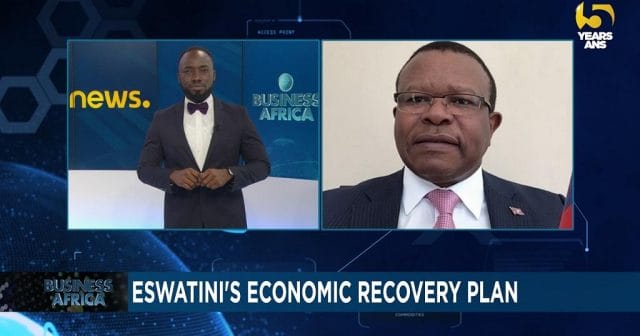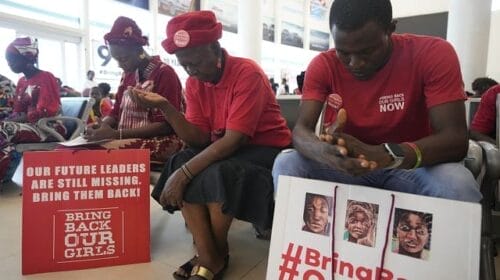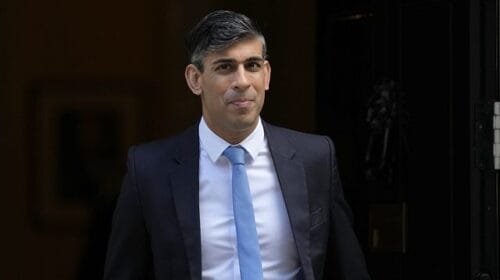eSwatini’s economy risk crashing [Business Africa]

eSwatini’s economy risk crashing
The Kingdom of eSwatini is carving a path to a private-led economy. An economy at risk of crashing if it does not embrace crucial economic reforms. For a while now, the Kingdom has been struggling to attract investments. But the covid-19 pandemic seem to have presented the opportunity it needs to restructure the local economy. That’s why late last year, eSwatini unveiled an economic recovery plan to get it out of the woods.
The Kingdom of eSwatini is expecting big things from its ambitious post-Covid-19 economic recovery plan
Managers of this small landlord monarchy in Southern Africa are hopeful that the plan will jolt the economy into a much stronger one after the pandemic, compared to its neighbors in the region.
The Post COVID-19 Economic Recovery Plan released by officials detailed its focus on 8 sectors of the liSwati economy, amongst which business, agriculture, tourism and environment, mining, but also energy and water.
But 8 months after the recovery plan was drafted, eSwatini’s economy has yet to feel the effects of the stimulus.
Before covid-19 hit eSwatini, the government was already experiencing cash- flow setbacks.
The virus only battered a long existing and fragile fiscal issue. Slowdown in economic activities has meant revenue loss. Creating an even bigger fiscal deficit.
Economic managers fear that without any significant reforms and adjustment in government spending, the economy will experience a severe crash.
The country’s Minister for Commerce, Industry and Trade, Senator Manqoba Khumalo tells Business Africa that: ‘’We’ve created a list of projects that are basically implementation ready and that with government enablement and with a clear view of the value that they’re going to bring in terms of creating revenues for corporate taxes, revenues in payroll taxes, revenues in consumer taxes.’’
Rising youth unemployment in Djibouti
Youth unemployment in Djibouti is rising. Over the last 10 years, the rate of unemployment for young people has seen an uptick of more than 2 %. In 2001, youth unemployment in this Horn of African nation was pegged at 18.47 %. Estimates from the International Labor Organization show that the figure jumped to 21 % in 2020. In Djibouti city, start-ups are being considered to ameliorate the situation.
It is a big day for Daoud Mohamed Ali and his friends. They’re presenting their technological solution at the Djibouti robotic competition. If successful, it begins a promising entrepreneurial adventure.
“This is Our project. It is a smart eyeglass that is intended for the blind and the visually impaired. This eyeglass will help them move and will give them some kind of autonomy”, said Daoud Mohamed Ali of Startupers.
Djibouti may have achieved growth rates of over 6% in recent years. But nearly two-thirds of its population is unemployed.
An even more endemic situation among young people aged 20 to 25, who are close to 80%.
To try to reverse this trend, competitions like these are organized to select the country’s future young start-ups.
At this center, the best are supported with accommodation, training, advice and financing in the early stages of their entrepreneurial life.
“There is a population of young people who do not have the academic level to create activities that will take them out of precariousness. We also target these young people who have the academic level, these young startupers who will create employment”, said Oubah Ahmed Malow, Director General of the Leadership and Entrepreneurialship center.
Correspondent Serge Koffi reports that: ”With a connectivity of 8 submarine cables, Djibouti is one of the most connected countries on the continent. With this advantage, this nation on the Horn of Africa now wants to encourage the development of a digital economy that contributes to the gross domestic product.”
For its future, Djibouti is betting on digitalization. In this other private incubator specialized in supporting startups focused on digitalization, the urgency is to strengthen the employability of young people.
Samatar Abdi Osman is founder of the center for Technology and Innovation Development.
“The challenge is there, and it’s a big one. It is precisely how to allow the Djiboutian youth to benefit by being actors and people who produce instead of becoming consumers”, he said.
Today, the country dreams of becoming a regional digital hub, and wants to see digital activity provide as much revenue as the port, which contributes 75% of the GDP to the Djiboutian economy.
Mozambique: Economic cost of Palma attacks
Mozambique is likely counting the economic cost of insurgency. French energy giant Total has suspended its operations there, and declared force majeure. The company says quote: ‘’it is the way only to best protect its interest until work can resume’’.
It’s a big blow to an economy currently reeling under attacks by insurgents. The African Energy Chamber is disappointed at the development.
It urges both parties to find practical solution to cease the force majeure and resume the project to benefit Mozambicans.
On Monday April 26, Total declared force majeure on its $20 billion Liquefied Natural Gas (LNG) project in Mozambique.
The French energy giant has withdrawn all personnel from the site after insurgent attacks in March.
The coastal town of Palma is home to the gas projects worth $60 billion.
The investment was expected to help transform Mozambique’s economy. By declaring force majeure, Total is allowed to cancel contractors.
The company was aiming to produce its first cargo from the LNG project in 2024.
The attacks that led to the slaying of dozens of civilians have dealt a blow to the African nation.
Mozambique would have been turned into a major producer of LNG, rivalling the likes of Australia, Qatar, Russia and the United States.





